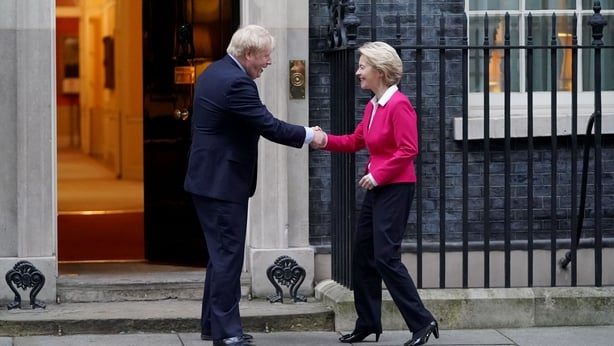British Prime Minister Boris Johnson had a "positive" meeting with European Commission President Ursula von der Leyen, his office has said.
The meeting between the two comes ahead of longer-term trade talks to take place after Britain leaves the European Union on 31 January.
"The PM was clear that the UK would not extend the Implementation Period beyond 31 December 2020, and that any future partnership must not involve any kind of alignment orEuropean Court of Justice jurisdiction," Mr Johnson's office said in a statement.
"He said the UK would also maintain control of UK fishing waters and our immigration system," it added.
This is the story of old friends and new beginnings.
— Ursula von der Leyen (@vonderleyen) January 8, 2020
In our meeting today, PM @BorisJohnson and I agreed:
🇪🇺& 🇬🇧 share common values and many interests. Climate change, human rights & security are just a few areas where cooperation on the global stage will be invaluable. pic.twitter.com/nqFYUPr6vV
Ahead of the meeting, Ms Von der Leyen had warned that Britain cannot expect the "highest quality access" to EU markets if it abandons Brussels rules after Brexit.
She said talks on a free trade deal after Britain leaves the EU at the end of January would be "tough", with both sides seeking to protect their own interests.
She said Mr Johnson's insistence that there could be no extension of the transition period beyond the end of 2020 meant there was a limit to what could be agreed before the UK's final break with the EU.
Ms Von der Leyen said they would need to "prioritise" those areas where there were no international agreements to fall back on to avoid a damaging "hard Brexit".
Mr Johnson was expected to use their talks in Downing Street to underline his insistence that, while he wants an "ambitious" free trade deal, UK "alignment" with EU rules must finish at the end of the year.
Read more:
Latest Brexit headlines
.@seanwhelanRTE with analysis as British Prime Minister @BorisJohnson welcomes European Commission President @vonderleyen to Downing Street for talks | https://t.co/mZcj8ScmPo pic.twitter.com/5XrlBHrZXZ
— RTÉ News (@rtenews) January 8, 2020
Speaking earlier at the London School of Economics, where she studied, Ms Von der Leyen said that would have "consequences" for the sort of agreement that could be reached.
While the EU was ready to sign up to an agreement based on "zero tariffs, zero quotas", there also had to be "zero dumping" of cheap exports on European markets.
"The European Union is ready to negotiate a truly ambitious and comprehensive new partnership with the United Kingdom. But the truth is that our partnership cannot and will not be the same as before," she said.
"With every decision comes a trade-off. Without the free movement of people, you cannot have the free movement of capital, goods and services.
"Without a level playing field on environment, labour, taxation and state aid, you cannot have the highest quality access to the world's largest single market."

She said that, throughout the negotiations, the EU would be committed to upholding the integrity of the single market and the customs union.
"There can be no compromise on this. But we are ready to design a new partnership with zero tariffs, zero quotas, zero dumping. A partnership that goes well beyond trade and is unprecedented in scope," she said.
However, she said the timetable set by Mr Johnson to get a trade deal agreed and ratified by the end of the year was "very, very tight".
"Without an extension of the transition period beyond 2020, you cannot expect to agree on every single aspect of our new partnership. We will have to prioritise," she said.
In London, @vonderleyen & I met @BorisJohnson & looked at the year ahead: negotiating a new partnership but, as the President said @LSEnews, it will not be as close as now. Time is short. A new ⏰ is ticking. Our focus = implementing the WA & preparing negotiations on EU side. pic.twitter.com/hw3IueBVLm
— Michel Barnier (@MichelBarnier) January 8, 2020
British Brexit Secretary Stephen Barclay, who will also take part in the talks along with the EU's chief negotiator, Michel Barnier, said he was confident an agreement could be reached by the end of year.
"I think there is scope for a very positive and optimistic approach to the trade deal," he told Sky News.
"Both sides have committed to securing a trade deal by the end of December 2020. That is in the Political Declaration."

